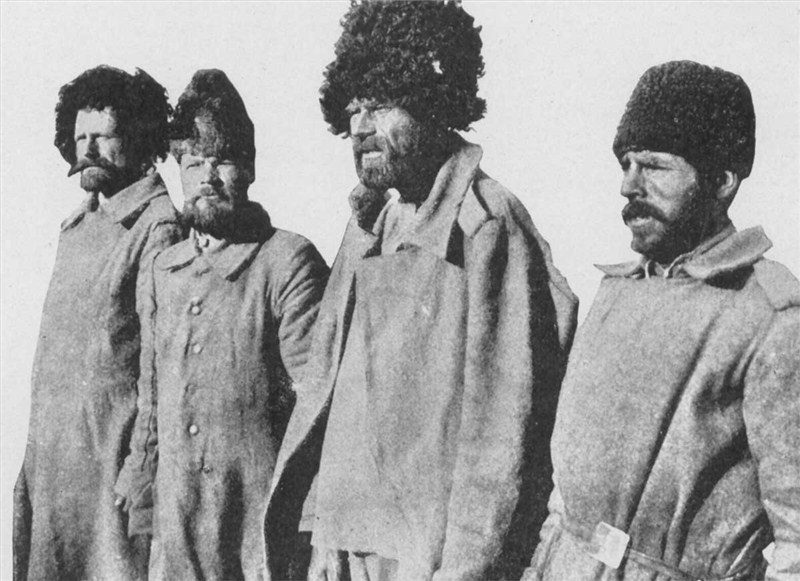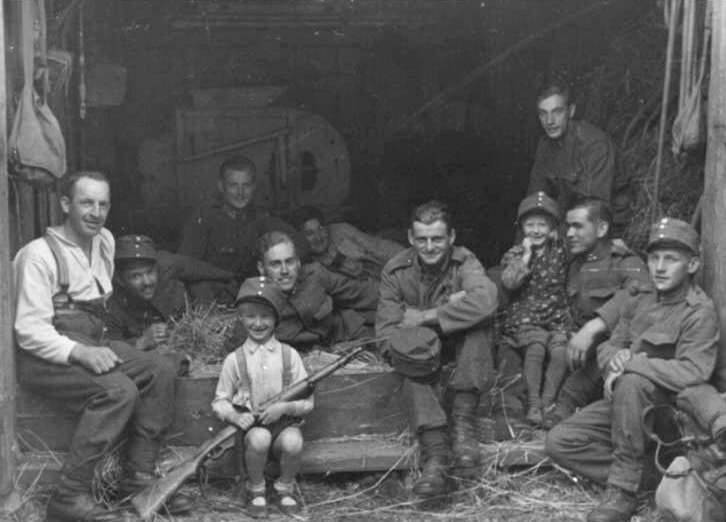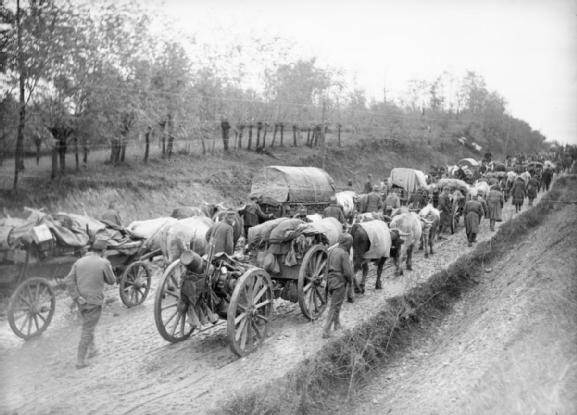
Of all the highs and lows of the last year, nothing irritated the German High Command than what was termed the “Krakow Peninsula” – An outpost of Russian forces following the Austrian failure to defend Galicia in the winter of 1914. Naturally, it was decided that this was the prioritised target for the Eastern Front. Over a million conscripts, let alone experienced members of the armed forces, descended upon the eastern side of the Polish city in an attempt to create an island out of the ‘Peninsula’. Minor attempts at resisting the Austro-German pincer movement were soundly beaten by the greatly numbered forces of the Central Power, and it wasn’t long before the fortress was surrounded. The result was almost one and a half million soldiers besieging a force four times as small. As valiantly as the Russians may have fought, ultimately nothing could be done to save themselves from the inevitable. An instrument of surrender was signed after a short but bloody battle, and camps within the Central Powers found themselves overwhelmed by the prisoners.
[-3,058 regulars and 13,377 conscripts to Germany, -138 regulars and 26,381 conscripts to Austria, -2,052 regulars and 48,460 conscripts to Russia, with 44,812 regulars and 223,741 conscripts taken as Prisoners of War]

Russian generals had spent the months since the Battle of Warsaw arguing over how best to defend the besieged city. While a rough plan had been formulated, the details were far from being finalised. However with the news of the loss of Krakow coming in, it became evident there was no time to lose. The Tsar boasted to his generals that the ordinary Russian soldier was not to be restricted, but should be allowed to use their imitative, and with that what little complaints remained concerning the plans were silenced. A grand force of 600,000 was quickly conjured to assault the Teutonic fortress of Königsberg before rushing to relieve Warsaw of pressure. Unfortunately for the Russians, their plan was rudely interrupted by the discovery German army number almost 1.2 million planning their own major operation. Initially surprised, the German defenders pushed back resulting in heavy losses for the bemused Russians. The relief of Warsaw was now but a distant dream.
[-9,707 regulars and 25,099 conscripts to Germany, -1,388 regulars and 78,704 conscripts to Russia]
German forces had taken to pounding the defences of Warsaw ever since the failure to capture it in the winter of last year. With the news of both the fall of Krakow and the knowledge that no extra Russian troops would be able to save the defenders, it was decided for the 2nd Battle of Warsaw to commence. As artillery shells bombarded the city walls, the Russians were initially ordered to hold to the last man; but it was a lost cause. Not far from Warsaw, the town of Lublin found itself overwhelmed by the victorious Austrian force advancing from Krakow. The Vistula had allowed for excellent transport capability, and the Austrian forces surprised even their own High Command by arriving as soon as they had. With the situation around them becoming more and more desperate, it was resolved that the Russians should attempt a lengthy retreat back to the motherland. Abandoning the lost cities, the Russians attempted to regroup and began the march eastwards.
Having brushed off an earlier attack in Prussia, the Germans under von Hindenburg had taken to occupying the Vistula Land with the aim of isolating the Russians. Only one obstacle remained in his way – the fortress of Osoweic. His men had been besieging the fortress for months, and with the news of a great retreat incoming, Hindenburg knew he could afford to waste no more time. The use of chemical gas was authorised, and within hours the Germans advanced under the perception that all were dead. They were wrong. Out of the poisonous fog came burned Russians, coughing up blood – and yet never yielding. They bravely counter-attacked the shocked Germans, but Hindenburg dismissed the sight of ‘dead men’ and pressed onwards. No matter how hard they fought, the Russians found themselves encircled on all sides by an army vastly outnumbering them. What followed was much like Krakow.
[-23,984 regulars and 61,404 conscripts to Germany; -264 regulars and 45,593 conscripts to Austria; -17,031 regulars and 148,333 conscripts to Russia with 156,280 regulars and 488,309 conscripts taken as Prisoners of War]

With a sense of glory and renewal growing within the minds of the Austrian high command, the famed Austrian General von Hötzendorf eagerly announced a plan for the recapturing of Galicia. Krakow had been reincorporated and Poland was the playground of the Central Powers, and this was the next obvious step. The General envisioned an army of almost a million to be sufficient to lead the assault, especially with the failure of the Russians to properly retreat. Advancing forward with high spirits, the Austrians found a terrifying sight before them. Although Poland may have fallen, the Russians were prepared to remain in Galicia with an army almost double the Austrians’ comfortably occupying. Having underestimated the immense manpower of the Russians, von Hötzendorf was briefly conflicted - but with the pressure of the German High Command behind him and the morale of his men unwavering, he begrudgingly pushed onwards into this suicidal mission.
...Or so he thought. Much to everyone’s surprise, the commencing slaughter resulted in the rout of the Russians. Galicia was firmly Austrian once again, and von Hötzendorf commemorated as a hero.
[-538 regulars and 96,385 conscripts to Austria; -177 regulars and 112,408 conscripts to Russia]

The next step for the Austro-Hungarian Empire was the taming of the country which had started this whole damned mess. Although Montenegro had been occupied as of last year, it was of no comfort to the Austrians that the path to the undefended Albania lay open. A plan to eject the Serbians from Novi Pazar was formulated and a jubilant Austrian army marched forwards. With the Russians routing, this will surely be an easy battle. The truth couldn’t have been any more different. Serbians, defiant as always, resisted despite their inferior numbers and quality. With the aid of the Montenegrin army to fight on, the battle came to a stop with understandably shell-shocked Austrians unable to dislodge the brave Balkan power despite inflicting heavy losses.
[-2 regulars and 21,664 conscripts to Serbia; -154 regulars and 10,745 conscripts to Austria]
Determined not to let the Serbians taunt them through their surprising victory, the Austrians pushed on with an ambitious plan to annihilate the country once and for all. Built upon the Danube River, the Austro-Hungarian Empire was perfectly positioned to use the river to support their logistics much like the Vistula had. It wasn’t long until both shores of the river had Austrians stationed across it. With Serbia effectively isolated, an almighty attack descended upon the small country. As valiantly as they had fought on, it was realised that this was nothing short of a futile attempt at delaying the unavoidable. Suffering from heavy losses and the realisation that they couldn’t hold on forever, the Serbian army took to a retreat towards Albania through the successfully defended town of Novi Pazar.
[-2,725 regulars and 36,334 conscripts to Serbia; -188 regulars and 18,974 conscripts to Austria]
Despite the entirety of Serbia soon underneath the rule of the Habsburg realm, all was not lost for the Serbians. A small detachment from the French blockade of Austrian sailed down to Albania, where the majority of the Serbian army managed to successfully board the ships. Steaming onwards towards Marseilles, they vowed to continue the fight from abroad and to help their French brothers against the Germans. However, delaying action by a few remaining regiments of the Serb army had left them stranded in Albania, with the Austrians on their tails. Luckily help was to come in the form of Russia’s Black Sea Fleet. Initially stopping by the Ottoman-held island of Rhodes to refuel, a violent bout of drinking resulted in the accidental death a several civilians soon saw the Russians sail rapidly away towards Albania. The ongoing pursue of the Serbian army led to a second international incident, as the Serbs crossed onwards towards the Greek island of Corfu as they attempted to link up with the Russian escorts. Although they too managed to successfully regroup in France, it was not without trouble.
[A Serbian army of 43,462 regulars and 267,199 conscripts await orders at Marseilles; the entirety of Serbia is occupied by Austria]

The French and Russian navies weren't the only marauding around the seas of Europe, as the German submarine fleet continued with its fearsome attempts to wreck the Entente's shipping. Despite merchant fleets at great risk, the lack of progress in upgrading either the submarines themselves or their naval doctrines resulted in little to no progress being made upon the high seas.
[Russia is still partially blockaded, and France is still safe from the submarines]
With the re-conquest of Alsace-Lorraine more realistic than ever since the capture of Colmar in 1914, French forces decided it was time to push on and finish the job. Skirmishing along the German fortifications for yet another weak spot, it was not long until an undermanned garrison was found in the north of the province. French troops swarmed towards Metz in attempt to repeat last year’s success – and that was precisely what happened. Over the course of a week, the town fell and the tricolour flew proudly above it. Determined to break through into the heartland of Germany, the French army then converged around the last outpost of German Alsace. Strasbourg, however, made for the ideal fort with even churches serving as impenetrable bastions. As hard as they fought, the French found themselves in a disappointing stalemate despite their victory at Metz.
[-10,865 regulars and 52,402 conscripts to France, -14,991 regulars and 38,072 conscripts to Germany]

The French army met uninterrupted success elsewhere. A colonial regiment formed from their African populations descended upon the German colony of Tanganyika where they quickly outnumbered the defending Germans. With the help of cruisers shelling the city’s coast, Dar Es Salaam soon fell to French hands. A reinforcing division of conscripts soon accompanied the colonial auxiliary, as they marched onwards into the once-German colony.
[-2,549 reservists to France, -2,974 reservists to Germany]
Two had fallen, and two remained. The third of Germany’s colonies within Africa to be attacked was Kamerun, which with upgraded logistics in light of last year faced attacks not from one or two sides, but from three. Regiments advanced onwards from the French Congo, pressuring the overwhelmed defenders from either side. While most quickly surrendered to the superior forces, a few Germans fought on – to the death. The colony was occupied with further ease due to the assistance of conscripts incoming from French Equatorial Africa, who finished off the remaining militia yet to surrender.
[- 157 conscripts and 1,356 reservists to France, -2,655 reservists to Germany]
Casaulties
Russia: 1,879,167
Austria: 1,494,911
Germany: 612,862
Poland: 521,782
Serbia: 272,367
France: 144,591
Albania: 69,796
Montenegro: 29,205
Total Casaulties: 5,024,711

